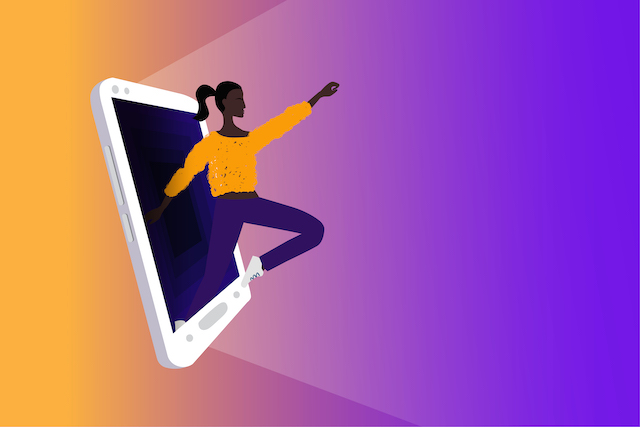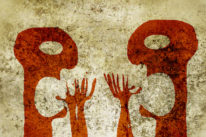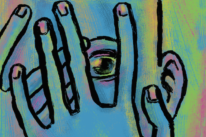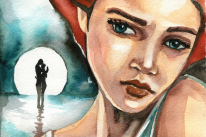
“Tell me what you pay attention to and I will tell you who you are.” ~Jose Ortega y Gasset
I used to live in San Francisco, a city celebrated for its carnivals, free music festivals, thriving bar culture, Mexican food markets, beautiful parks, fantastic literary events, thrift stores, and… (Can you tell I miss it?]
The effect of having all this culture available is that quite often, we spend more time around the doing of an event than the doing itself. I’ll elaborate.
I would spend x amount of time on my phone searching for cool events to go to. Then I would be on Facebook, advertising this future event and inviting friends.
The day of the event I would spend time calling and texting people to establish a meeting place, before following the little blue dot to find that place. Then, during the actual event, I would spend x or even xxxx amount of time trying to find signal to call a lost friend or—in the more likely case—relocate my lost self and find the group.
When not trying to find signal and/or friends, I would be sending texts telling people who couldn’t make it what they were missing out on.
Or I’d be holding my phone in the air taking x amount of pictures of where I was and publishing the photos on Facebook/Instagram/Snapchat/all the above (checking my phone every x minutes thereafter to get an update on like-count) trying to show the world how much fun I was having (read: forgetting to have).
Does any of this sound familiar? The x amount of time spent on my phone combines to way more x’s than the time spent enjoying x event itself. See, I can’t even remember what the event was.
I remember Nokia’s first advertising campaign: “Connecting People.” Now this slogan would more correctly read: “Connecting Phones,” because I observe that the people behind the phones are actually hugely disconnected from valuable forms of interaction, myself included.
We live in a world where losing your phone is more dramatic than losing your virginity, and I found it way more distressing because I couldn’t call my mum and tell her about it.
I lost my phone in the fatal sense; it fell to its death and I was phoneless for a month. This month was somewhat transformative for me. I mean, I know that a phone isn’t technically a limb, but at first it felt very hard to walk anywhere if I wasn’t 100% sure that I was going in the right direction.
My phone used to guide me. It was brave to go somewhere to meet a friend, not sure if they’d had to cancel without being able to let me know. My phone used to confirm things. Another hard thing was the not knowing what my friends had eaten for dinner the previous night. Instagram used to show me.
How are people going to invite me to things?! Denial, anger, frustration, loneliness… I’M FALLING OFF THE RADAR! People will forget me! Desperately clicking my heels “There’s no place like phone, there’s no place like phone” … *Spiral into delirious black out.
It’s hard to believe that a month later I had become pretty nonchalant about even getting my phone fixed. I could now afford to, but I had discovered a charm and liberation to my life without a phone that I was now scared to lose.
Here are some ways I found myself when I lost my phone:
1. I would give myself time to get lost, and enjoyed taking notice of my perhaps wayward route.
I would find things on the way that I’d never seen before—great street art and food joints. If really lost, I would ask locals for directions, and in so doing met interesting characters and appreciated their willingness to help me. I enjoyed not being self-reliant.
2. My friends were always there to meet me at the time we’d planned in advance.
When is the last time you made plans with a friend a week or two in advance—Lunch at Rosso on the 12th, 2:00—and not called to confirm before hand? It’s a test in your trust that friends won’t let you down, nor you them. It’s fun to have something to look forward to and to simply… show up.
3. I didn’t update Instagram nor Facebook for a month.
I lost the urge to show people a #nofilter photograph of my burrito or let Facebook know which Disney Princess I am according to Buzzfeed. I started reading more, enjoying my own company. When I had moments to spare, I would reflect on my day rather than take out my phone and read about everybody else’s.
4. I started being present at events in the true sense of the word.
If you spend all your time on social media telling people where you are, it probably means you weren’t present at all. I mean, take a cool picture, by all means; start a photography blog. But a photograph should be a memory of an experience, not the experience itself. Don’t check out when you check-in.
5. I became more spontaneous.
There is something organic about running into friends unexpectedly, when the stars align to connect you with someone even when you couldn’t call to make plans. I could be more spontaneous without a phone, or perhaps it just felt that way because as it was harder to plan things. I started to accept and embrace all the twists and turns of my day.
6. I became unreachable at times.
It feels great to be unreachable in a world where we are expected to be so available. We are at the beck and call of a beep or a buzz, and apologize if we respond to a text twenty minutes later because we were in the shower.
I realized that my time is my own and stopped feeling that I owed people my attention 24/7. When you disconnect from the outside world, you connect with yourself.
7. I became acutely aware when my company was dividing his/her attention between their phone and me, and I hated it.
That’s probably how I used to interact before I learned how it feels to speak to the top of someone’s head. I enjoyed the dose of self-awareness, and I like to think I’ve become better company for it.
8. I realized I wasn’t really staying in touch.
What I’d been doing to “stay in touch” with friends were things such as liking their Instagram photo, commenting on their Facebook status, vaguely committing to an event they were hosting with no real intention to go, texting sporadic and disinterested-sounding questions like “How’s life?” etc.
Without a phone, I realized how lazy my most valued friendships had become, namely, because I didn’t suddenly feel disconnected from those people; rather, I realized I hadn’t been connected in the first place.
I’m not suggesting that you should smash your phone on the ground after reading this; I eventually had my phone fixed, and in these times there are obvious safety and organizational benefits to having one.
What drives my thought process is this: Phones are merely tools, and we are at risk of trying to extend their function beyond their limitations. Phones are a poor substitute for real interaction, presence, experience and connecting.
Life doesn’t happen on a tiny screen. Take a leap and leave your phone at home once in a while. Say brb and give your immediate world your undivided attention, because that’s where the good stuff is, and you’re missing it.
About Jessica Wretlind
A graduate of English Literature, Jessica now lives in London and only finds time to read the Metro. Inspired by her earthy boyfriend who is enrolled at a spiritual study retreat in California, Jessica occasionally self-reflects her way out of the London bustle and writes down her more tangible musings.













 Though I run this site, it is not mine. It's ours. It's not about me. It's about us. Your stories and your wisdom are just as meaningful as mine.
Though I run this site, it is not mine. It's ours. It's not about me. It's about us. Your stories and your wisdom are just as meaningful as mine.
This is an amazing post Jessica, more because this stuff relates to almost everybody out there with a smart phone, sucked into the silly features and trends set by the phone makers & service providers.
You have really written it well and I am sure your post will teach something to those who eyeball it.
“A good teacher, like a good entertainer first must hold his audience’s attention, then he can teach his lesson.” – John Henrik Clarke
Your message in the end is classy : “Phones are merely tools, and we are at risk of trying to extend their function beyond their limitations. Phones are a poor substitute for real interaction, presence, experience and connecting.
Life doesn’t happen on a tiny inch screen. Take a leap and leave your phone at home once in a while. Say brb and give your immediate world your undivided attention, because that’s where the good stuff is, and you’re missing it.”
Will end with a quote : “Only one thing has to change for us to know happiness in our lives: where we focus our attention.” – Greg Anderson
Thank you.
Great post Jessica! Thanks for sharing. I haven’t gone cold turkey in abandoning my phone, what I have done is altered the way I use it and how I have it setup. First, I deleted the Facebook app because I would always check for the sake of checking it. Disrupting my present moment for no apparent reason. Most times I wouldn’t even realize I was checking. I was so out of tune with myself. Secondly, I removed all notifications and sounds on the lock screen and home screen. I would find myself stopping everything and anything to see what had just come in. It was so disruptive. But, I so agree with your point #7, as you become more aware of yourself in this situation, you notice it with others around you. And this to is something that frustrates me. Thanks so much for sharing Jessica!
Jessica, I love how you write. You’re funny! I know exactly how you feel. I deleted my Instagram. I deactivated my Facebook. People think I am extremely anti-social because of it. I feel great though. I am living more in the moment. I rather socialize in person. I do better at school and at work. Social networking is super addicting. It makes people anti-social because they are living behind a computer screen. It makes relationships much less meaningful. It’s okay to use a phone, but it’s not okay for the phone to use you! Thanks for sharing! 🙂
Jessica- well written: Now-a-day when I go for evening walk, I don’t take my cellphone and notice that I talk with people, smile, watch my surrounding more and enjoy. When I go for vacation, instead of taking 500 pictures to create memories, I enjoy the moment and create memories in my mind, I feel happy when I live in the moment.
This is incredibly well written. Nice work! Loved the voice. My favorite quip:
“When I had moments to spare, I would reflect on my day rather than take out my phone and read about everybody else’s.”
I absolutely loved this and can relate to it. Although, when I did it I didn’t have much of a choice! I had just moved out and was short on money. My phone was disconnected. It was only for a week but it was exactly what i needed! After that week, I posted less on FB, Instagram and Snapchat, not being available 24/7 was nice. I now only share very little on social media. I deleted the FB app and Messenger from my phone, so I wouldn’t check it as often! I’ve never been a selfie or food picture taker but I did love to share the places I traveled to. I now and then post “updates” on what I’m up to and where I’ve been, but I rather share my life with the select few than hundreds of acquaintances. I love catching up with friends or meeting new people cause they won’t know EVERYTHING about me by looking at my social media pages. Just gives them an Idea of who I am.
This was awesome…being disconnected is actually being interconnected. I love my social media but I also have to remind myself that the world is so much more.
“Life doesn’t happen on a tiny inch screen.
Take a leap and leave your phone at home once in a while. Say brb and
give your immediate world your undivided attention, because that’s where
the good stuff is, and you’re missing it.” This reminds me of a beautiful video that came out a week or so in youtube called, “Look Up.”
Btw; I didnt quite understand what you meant for the #7 suggestion…did you mean because of your new-found ‘awareness’ about your own earlier addiction with phone while talking to someone, made you understand & less annoyed when they juggled between talking to you & getting distracted by the phone?
its beautiful, have sent to my closest …
I loved this. It’s so true- why live life through a tiny screen- enjoy the vastness of the view by truly participating in the here and now.